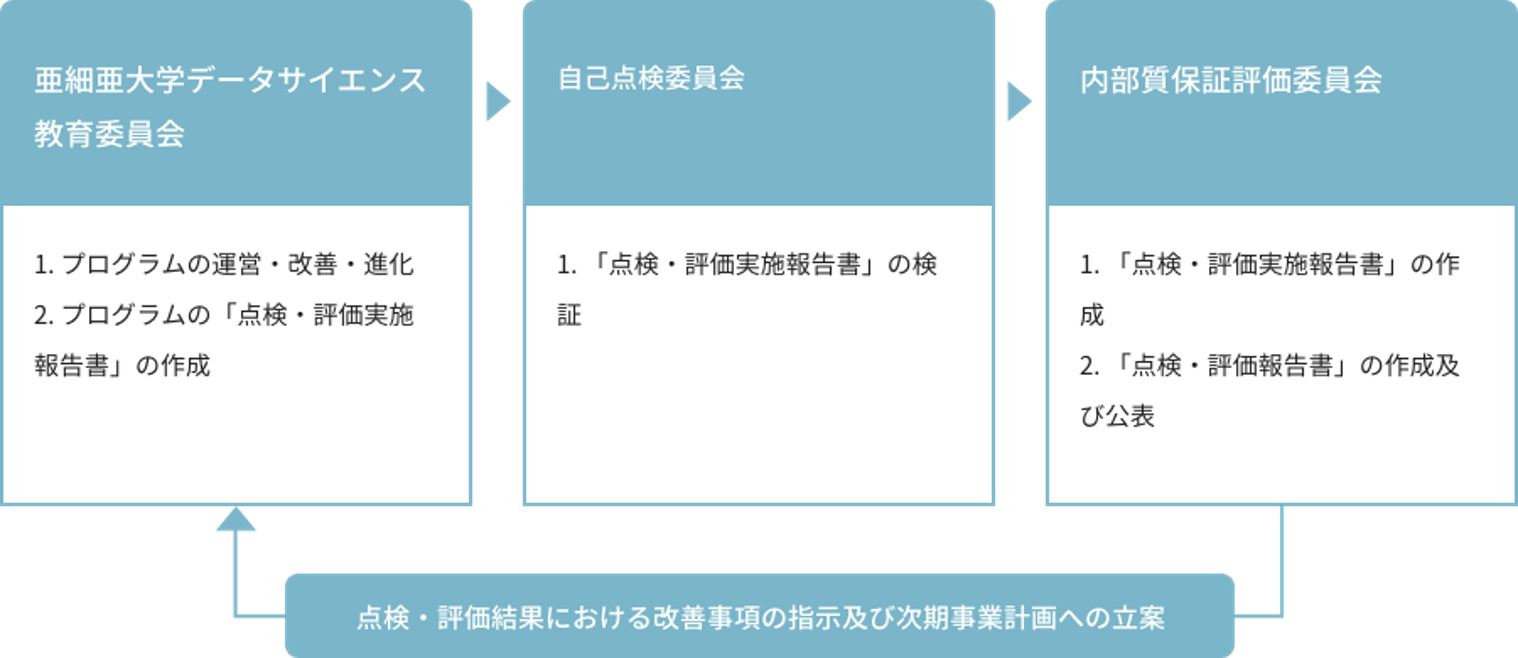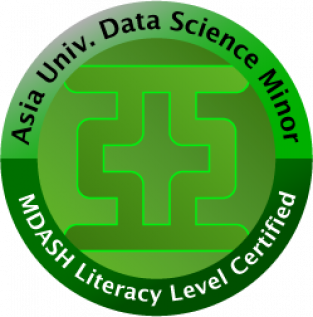- Asia University
- faculty
- How to study at Asia University
- Sub-major system
- Data Science Minor
Data Science Minor
INDEX
Asia University MDASH Applied Basic Program
This program has been certified as a literacy level and applied basic level by the Ministry of Education, Culture, Sports, Science and Technology's ``Mathematics, Data Science, and AI Education Program,'' and is an open program that can be taken by students from all faculties and departments.Literacy level
![[Deadline for literacy level certification]](/albums/109/abm00000233.jpg)
[Deadline for literacy level certification]
Until March 31, 2026
Mathematics, Data Science, and AI Education Program Certification System (Literacy Level) Application Form Change Notification
Applied basic level
![[Deadline for Applied Basic Level Certification]](/albums/109/abm00000234.jpg) [Applied basic level certification deadline]
[Applied basic level certification deadline]Until March 31, 2027
Mathematics/Data Science/AI Education Program Certification System (Applied Basic Level) Application Form Change Notification
Related Links
What is Data Science Minor
Data Science Minor is a minor designed to enable you to systematically learn knowledge about data science, which has played an important role in many industrial fields in recent years, by taking courses in Asia University MDASH Applied Fundamentals Program. . Students from all faculties except Department of Data Science Faculty of Business Administration can take this course*.
Students who earn 20 Credit more credits from a designated subject group will receive a certificate of completion upon graduation.
*Students Department of Data Science can take courses in the same program without enrolling in a minor.
Students who earn 20 Credit more credits from a designated subject group will receive a certificate of completion upon graduation.
*Students Department of Data Science can take courses in the same program without enrolling in a minor.

Target image
In Data Science Minor, we develop human resources who can not only statistically analyze data from an interdisciplinary perspective, but also analyze problems and solve them using methods such as artificial intelligence (AI). For this reason, we have adopted a curriculum that emphasizes not only the basic learning of statistics and programming, but also the development of problem analysis and problem-solving skills through project-type Seminar in small groups.

ability to acquire
- In addition to being able to statistically analyze data from an interdisciplinary perspective, it is also possible to analyze problems and use methods such as artificial intelligence (AI) to solve them.
- Humanities students can acquire the basic skills to apply data science from business to environmental problems.
- Acquire basic data science methods, select appropriate analysis methods and algorithms for a given data set at your own discretion, perform analysis, and be able to interpret the results.
- Understand the basic techniques of artificial intelligence, machine learning, and deep learning and be able to apply them to real-world problems.
- Acquire the mindset to solve unknown problems using data science methods.
curriculum
Data Science Minor subject group begins with subjects that study mathematics and statistics, which also serves as a review of high school, background natural science, and information ethics.In the core course "Introduction to Data Science", students learn the basics of data analysis programming using the programming language Python, and learn conventional methods such as regression analysis and clustering using actual data obtained from the Internet of Things (IoT). , machine learning, and the latest techniques such as deep learning.
Furthermore, in the "Data Science Application Projects I and II", project-based Seminar on artificial intelligence (AI) and virtual reality (VR) will be conducted. Through these STEM education, liberal arts students develop the basic skills to apply data science to everything from business to environmental issues.
Furthermore, in the "Data Science Application Projects I and II", project-based Seminar on artificial intelligence (AI) and virtual reality (VR) will be conducted. Through these STEM education, liberal arts students develop the basic skills to apply data science to everything from business to environmental issues.

2020 Curriculum
| background knowledge | mathematical method | statistical method | programming | application | |
| [3rd and 4th year] development |
Exploring the world of mathematics | Exploring the World of the Web | |||
| [2nd year] Basic/Application |
Data Science Application Project I・II | ||||
| Introduction to data science Spreadsheets and data science |
Programming language I programming language II |
||||
| [1st year] introduction |
Information and Society I Introduction to Natural Science II |
Introductory Mathematics I Introductory Mathematics II |
Introduction to Statistics I Introduction to Statistics II |
||
Reiwa 3rd and 4th year curriculum
| background knowledge | mathematical method | statistical method | programming | application | |
| [3rd and 4th year] development |
Comprehensive Academic Seminar I・II | ||||
| Exploring the world of mathematics | Exploring the World of the Web | ||||
| [2nd year] Basic/Application |
Data Science Application Project I・II | ||||
| Introduction to data science Spreadsheets and data science |
Programming language I programming language II |
||||
| [1st year] introduction |
Information and Society I Introduction to Natural Science II |
Introductory Mathematics I Introductory Mathematics II |
Introduction to Statistics I Introduction to Statistics II |
||
2020 Curriculum
| background knowledge | mathematical method | statistical method | programming | application | |
| [3rd and 4th year] development |
Exploring the world of mathematics | Exploring the World of the Web | |||
| [2nd year] Basic/Application |
Applied Information Ⅰ・Ⅱ | ||||
| Introduction to data science Fundamentals and Applications of Spreadsheets |
programming language programming language II |
||||
| [1st year] introduction |
Information and Society I Introduction to Natural Science II |
Introductory Mathematics I Introductory Mathematics II |
Introduction to Statistics I Introduction to Statistics II |
||
[2nd year] Practicum data analysis using the programming language Python
[3rd and 4th years] Project-type Seminar in small groups on artificial intelligence (AI) and virtual reality (VR).
Subject
SubjectCorrespondence with the model curriculum
Correspondence table between model curriculum and implemented subjectsImplementation system
| Committee organization name | role |
| Asia University Data Science Board of Education | (1) Operation, improvement and evolution of the program (2) Preparation of “Inspection/Evaluation Implementation Report” for the program |
| Self-inspection committee | (1) Verification of “Inspection/Evaluation Implementation Report” |
| Internal Quality Assurance Evaluation Committee | (1) Preparation of “Inspection/Evaluation Implementation Report” (2) Preparation and publication of “inspection/evaluation report” |

Self-check/evaluation
We will conduct and publish self-inspections and evaluations each fiscal year.FY2020 Inspection/Evaluation Report
FY2020 Inspection/Evaluation Report
FY2021 inspection/evaluation report
FY2020 Inspection/Evaluation Report
open badge
As a certificate of completion Data Science Minor at our university, we have introduced an "open badge", which is one of the digital certificates of completion, and will issue the badge from the first class of 2021.Data Science Minor is a minor designed to systematically acquire knowledge about data science, which has played an important role in many industrial fields in recent years. It is a proof that you have earned 20 Credit from the designated courses of our university and completed your minor.
 △ Open Badge Data Science Minor
△ Open Badge Data Science Minor*1 The technical standards for open badges are set by the IMS Global Learning Consortium.
《Pick Up》Data Science Application Project Ⅰ・Ⅱ
Teacher in charge: HORI Gen
In small groups, we will conduct project-type Seminar on the themes of visualizing multidimensional data using virtual reality and programming drone control using artificial intelligence (AI). Each group envisions what they want to do with virtual reality and drones, and each group creates different virtual reality content and drone control programs.
In small groups, we will conduct project-type Seminar on the themes of visualizing multidimensional data using virtual reality and programming drone control using artificial intelligence (AI). Each group envisions what they want to do with virtual reality and drones, and each group creates different virtual reality content and drone control programs.

“Unity education” to increase future options
At Asia University, we have adopted the "Unity Education Curriculum" and are working on the development of AR apps for the iPhone using Unity's AR Foundation and Xcode, and the "Asia University Metaversity" campus digital twin project.Unity CASE STUDY <Case Study>
<Updated March 22, 2024>